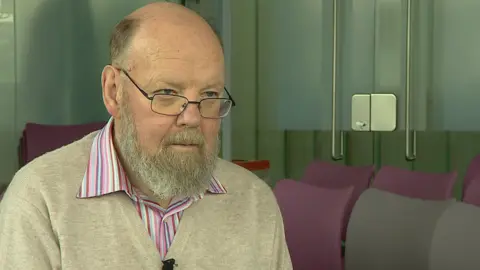Dolly the sheep professor's support for Parkinson's research
 BBC
BBCThe professor who led the team which created Dolly the sheep is backing new research into Parkinson's - after revealing he has the condition.
Professor Sir Ian Wilmut came into the spotlight when he unveiled Dolly in 1997. She was the first mammal ever to be cloned from an adult cell.
Her birth proved that specialised cells could be used to create an exact copy of the animal they came from.
Dolly's arrival in 1996 prompted horror stories and hope in equal measure.
And it led the way for other scientists to work on a new research initiative into diseases including Parkinson's, the degenerative disease which affects 12,000 people in Scotland.
Now, to mark World Parkinson's Day, the scientist has spoken exclusively to BBC Scotland about his hopes for the future and this major new research programme involving Edinburgh and Dundee universities.
He also revealed why he had decided to go public about such a personal situation.
"I think I see it slightly differently that I couldn't see a reason not to," he says.

"I didn't want to go around with a veil of secrecy around something, I'm not like that. If it's useful in any way to mention it, and in this research context it is, then I'm very happy to mention it."
He was diagnosed with Parkinson's before Christmas. He talks about how it affects his walking.
"There was a sense of clarity, well at least now we know and we can start doing things about it. As well as obviously the disappointment that it will possibly shorten my life slightly, and more particularly it will alter the quality of life.
"I've never been a Munro bagger but we live in the Borders and I like to walk. I asked my consultant last week, if I recovered my strength would you think it reasonable to aim on walking four or five miles a day, for several days.
"He was rather discouraging, as it is something I would miss if he proves to be right."
Parkinson's can cause a range of symptoms including slow movement, muscle stiffness and involuntary shaking.
Treatments can help symptoms but there is nothing to slow down or stop the progression.
The original cloning work which Professor Sir Ian Wilmut and his team carried out to produce Dolly at the University of Edinburgh's Roslin Institute had far-reaching consequences.
It led the way for others to develop a method of using adult cells to produce reprogrammable cells that could develop into any kind of tissue in the body - so-called induced pluripotent stem cells, or iPSCs.

These personalised stem cells are used at the MRC Centre for Regenerative Medicine in Edinburgh.
Dr Tilo Kunath, a group leader at the centre, said: "Professor Wilmut's cloning of Dolly the sheep really turned biological thinking on its head."
He added: "It really opened up the eyes of a lot of scientists - that you could reverse in time the age of cells or the age of an animal.
"That really influenced a very prominent scientist, Shinya Yamanaka, to make these stem cells that I've been using in my lab now for the last five years.
"His discovery has really opened up an area of biology that has transformed the way we try to study diseases, the way that we model diseases and I think it's really exciting that one of the conditions that iPSCs will be addressing is Parkinson's disease."
These cells hold great promise as therapy because of their potential to repair damaged tissues. The first clinical trials of iPSCs for Parkinson's are to begin in Japan later this year.
The Dundee-Edinburgh Initiative, which Professor Sir Ian Wilmut is backing, plans to set up the first clinical trials in Scotland aimed at slowing down Parkinson's. It will be launched on Friday.
Professor Sir Ian Wilmut explains: "To me science has always been important, not just because of the basic knowledge that it acquires but because of the opportunities, or in this case treatment.'"
